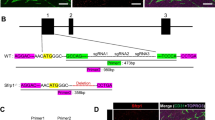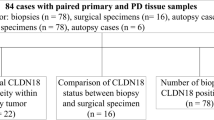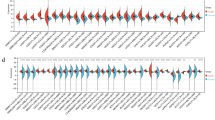Abstract
Aim
The vascular endothelial growth factor (VEGF) and TGF-β1 pathways play important roles in cancer. However, few studies have evaluated the expression and roles of VEGF-D, SMAD4, and SMAD7 in colon cancer, and the conclusions remain controversial. To clarify the roles of VEGF-D, SMAD4, and SMAD7 in colon cancer, we examined their expression and evaluated correlations with lymphangiogenesis, prognosis, and chemotherapeutic outcome.
Methods
The expression of VEGF-D, SMAD4, and SMAD7 was immunohistochemically examined in 251 primary colon cancer samples obtained from the Harbin Medical University.
Results
The expression of VEGF-D, SMAD4, and SMAD7 was identified in 71.7, 41.0, and 69.7 % of samples, respectively. Positive expression of VEGF-D and SMAD7 and lost expression of SMAD4 were significantly correlated with lymph node metastasis and high lymphatic vessel density. VEGF-D and SMAD7 were found to be independent indicators of prognosis and chemotherapy outcome, and positive expression of either VEGF-D or SMAD7 was associated with significantly shorter overall survival and disease-free survival (OS and DFS) than negative expression in all 251 patients (P < 0.001 for OS and DFS) and patients following chemotherapy (P < 0.001 for OS and DFS).
Conclusion
VEGF-D, SMAD4, and SMAD7 were involved in lymphangiogenesis and lymph node metastasis. VEGF-D and SMAD7 can serve as predictors of prognosis and chemotherapeutic outcome in colon cancer.



Similar content being viewed by others

References
Ramamoorthi G, Sivalingam N. Molecular mechanism of TGF-β signaling pathway in colon carcinogenesis and status of curcumin as chemopreventive strategy. Tumour Biol. 2014, 35(8): 7295-7305.
Tacconi C, Correale C, Gandelli A, Spinelli A, Dejana E, D’Alessio S, Danese S. Vascular endothelial growth factor C disrupts the endothelial lymphatic barrier to promote colorectal cancer invasion. Gastroenterology. 2015, 148(7): 1438-1451.
Szajewski M, Kruszewski WJ, Lakomy J, Ciesielski M, Kawecki K, Jankun J, Buczek T, Szefel J. VEGF-C and VEGF-D overexpression is more common in left-sided and well-differentiated colon adenocarcinoma. Oncol Rep. 2014, 31(1): 125-130.
Stacker SA, Caesar C, Baldwin ME, Thornton GE, Williams RA, Prevo R, Jackson DG, Nishikawa S, Kubo H, Achen MG. VEGF-D promotes the metastatic spread of tumor cells via the lymphatics. Nat Med. 2001, 7: 186-191.
Niki T, Iba S, Tokunou M, Yamada T, Matsuno Y, Hirohashi S. Expression of vascular endothelial growth factors A, B, C, and D and their relationships to lymph node status in lung adenocarcinoma. Clin Cancer Res. 2000, 6: 2431–2439.
Onogawa S, Kitadai Y, Tanaka S, Kuwai T, Kimura S, Chayama K. Expression of VEGF-C and VEGF-D at the invasive edge correlates with lymph node metastasis and prognosis of patients with colorectal carcinoma. Cancer Sci. 2004, 95(1): 32-39.
Bellam N, Pasche B. Tgf-beta signaling alterations and colon cancer. Cancer Treat Res. 2010, 155: 85-103.
Yu M, Trobridge P, Wang Y, Kanngurn S, Morris SM, Knoblaugh S, Grady WM. Inactivation of TGF-β signaling and loss of PTEN cooperate to induce colon cancer in vivo. Oncogene. 2014, 33(12): 1538-1547.
Hahn SA, Schutte M, Hoque AT, Moskaluk CA, da Costa LT, Rozenblum E, Weinstein CL, Fischer A, Yeo CJ, Hruban RH, Kern SE. DPC4, a candidate tumor suppressor gene at human chromosome 18q21.1. Science. 1996, 271(5247): 350–353.
Kim YH, Lee HS, Lee HJ, Hur K, Kim WH, Bang YJ, Kim SJ, Lee KU, Choe KJ, Yang HK. Prognostic significance of the expression of Smad4 and Smad7 in human gastric carcinomas. Annals of Oncology. 2004, 15(4): 574-580.
Oka M, Iwata C, Suzuki HI, Kiyono K, Morishita Y, Watabe T, Komuro A, Kano MR, Miyazono K. Inhibition of endogenous TGF-β signaling enhances lymphangiogenesis. Blood. 2008, 111(9): 4571-4579.
Chen C, SunMZ, Liu S, Yeh D, Yu L, Song Y, Gong L, Hao L, Hu J, Shao S. Smad4 mediates malignant behaviors of human ovarian carcinoma cell through the effect on expressions of E-cadherin, plasminogen activator inhibitor-1 and VEGF. BMB Rep. 2010, 43(8): 554-560.
Schwarte-Waldhoff I, Volpert OV, Bouck NP, Sipos B, Hahn SA, Klein-Scory S, Lüttges J, Klöppel G, Graeven U, Eilert-Micus C, Hintelmann A, Schmiegel W. Smad4/DPC4-mediated tumor suppression through suppression of angiogenesis. Proc Natl Acad Sci USA. 2000, 97(17): 9624-9629.
Li X, Liu B, Xiao J, Yuan Y, Ma J, Zhang Y. Roles of VEGF-C and Smad4 in the lymphangiogenesis, lymphatic metastasis, and prognosis in colon cancer. J Gastrointest Surg. 2011, 15(11): 2001-2010.
Duff SE, Jeziorska M, Kumar S, Haboubi N, Sherlock D, O’Dwyer ST, Jayson GC. Lymphatic vessel density, microvessel density and lymphangiogenic growth factor expression in colorectal cancer. Colorectal Dis. 2007, 9(9): 793–800.
Kazama S, Watanabe T, Kanazawa T, Hatano K, Nagawa H. Vascular endothelial growth factor-C (VEGF-C) is a more specific risk factor for lymph node metastasis than VEGF-D in submucosal colorectal cancer. Hepatogastroenterology. 2007, 54(73): 71-76.
Thomaidis T, Maderer A, Formentini A, Bauer S, Trautmann M, Schwarz M, Neumann W, Kittner JM, Schad A, Link KH, Rey JW, Weinmann A, Hoffman A, Galle PR, Kornmann M, Moehler M. Proteins of the VEGFR and EGFR pathway as predictive markers for adjuvant treatment in patients with stage II/III colorectal cancer: results of the FOGT-4 trial. J Exp Clin Cancer Res. 2014, 33: 83.
Voorneveld PW, Jacobs RJ, Kodach LL, Hardwick JC. A Meta-Analysis of Smad4 Immunohistochemistry as a prognostic marker in colorectal cancer. Transl Oncol. 2015, 8(1): 18-24.
Tascilar M, Offerhaus GJ, Altink R, Argani P, Sohn TA, Yeo CJ, Cameron JL, Goggins M, Hruban RH, Wilentz RE. Immunohistochemical labeling for the Dpc4 gene product is a specific marker for adenocarcinoma in biopsy specimens of the pancreas and bile duct. Am J Clin Pathol. 2001, 116(6): 831-837.
Bacman D, Merkel S, Croner R, Papadopoulos T, Brueckl W, Dimmler A. TGF-beta receptor 2 downregulation in tumour-associated stroma worsens prognosis and high-grade tumours show more tumour-associated macrophages and lower TGF-beta1 expression in colon carcinoma: a retrospective study. BMC Cancer. 2007, 7: 156.
Smith RA, Tang J, Tudur-Smith C, Neoptolemos JP, Ghaneh P. Meta-analysis of immunohistochemical prognostic markers in resected pancreatic cancer. Br J Cancer. 2011, 104(9): 1440-1451.
Halder SK, Rachakonda G, Deane NG, Datta PK. Smad7 induces hepatic metastasis in colorectal cancer. Br J Cancer. 2008, 99(6): 957-965.
Lamora A, Talbot J, Bougras G, Amiaud J, Leduc M, Chesneau J, Taurelle J, Stresing V, Le Deley MC, Heymann MF, Heymann D, Redini F, Verrecchia F. Overexpression of smad7 blocks primary tumor growth and lung metastasis development in osteosarcoma. Clin Cancer Res. 2014, 20(19): 5097-5112.
Azuma H, Ehata S, Miyazaki H, Watabe T, Maruyama O, Imamura T, Sakamoto T, Kiyama S, Kiyama Y, Ubai T, Inamoto T, Takahara S, Itoh Y, Otsuki Y, Katsuoka Y, Miyazono K, Horie S. Effect of Smad7 expression on metastasis of mouse mammary carcinoma JygMC(A) cells. J Natl Cancer Inst. 2005, 97: 1734-1746.
Boulay JL, Mild G, Lowy A, Reuter J, Lagrange M, Terracciano L, Laffer U, Herrmann R, Rochlitz C. SMAD7 is a prognostic marker in patients with colorectal cancer. Int J Cancer. 2003, 104(4): 446-449.
Gulubova M1, Manolova I, Ananiev J, Julianov A, Yovchev Y, Peeva K. Role of TGF-beta1, its receptor TGFbetaRII, and Smad proteins in the progression of colorectal cancer. Int J Colorectal Dis. 2010, 25(5): 591-599.
Chun HK, Jung KU, Choi YL, Hong HK, Kim SH, Yun SH, Kim HC, Lee WY, Cho YB. Low expression of transforming growth factor beta-1 in cancer tissue predicts a poor prognosis for patients with stage III rectal cancers. Oncology. 2014, 86(3): 159-169.
Itóh S, Landström M, Hermansson A, Itoh F, Heldin CH, Heldin NE, ten Dijke P. Transforming growth factor beta1 induces nuclear export of inhibitory Smad7. J Biol Chem. 1998, 273(44): 29195-29201.
Spencer SK, Pommier AJ, Morgan SR, Barry ST, Robertson JD, Hoff PM, Jürgensmeier JM. Prognostic/predictive value of 207 serum factors in colorectal cancer treated with cediranib and/or chemotherapy. Br J Cancer. 2013, 109(11): 2765-2773.
Acknowledgments
This study was supported by the Natural Science Foundation of Heilongjiang Province, China, grant number: D200920.
Author Contributions
All authors contributed to the design of this study and drafting of the article. The analysis and interpretation of data were completed by Fei Su, Xuemei Li, and Baoquan Liu, colon cancer samples were collected by Yafang Zhang and Jing Ma, and immunohistochemical staining was carried out by Xuemei Li, Kai You, Mingwei Chen, and Jianbing Xiao.
Author information
Authors and Affiliations
Corresponding author
Ethics declarations
Informed consent was obtained from all patients and the study protocol was approved by the Ethics Committee of Harbin Medical University.
Conflict of Interest
The authors declare that they have no conflict of interest.
Additional information
Fei Su and Xuemei Li contributed equally to this work.
Rights and permissions
About this article
Cite this article
Su, F., Li, X., You, K. et al. Expression of VEGF-D, SMAD4, and SMAD7 and Their Relationship with Lymphangiogenesis and Prognosis in Colon Cancer. J Gastrointest Surg 20, 2074–2082 (2016). https://doi.org/10.1007/s11605-016-3294-9
Received:
Accepted:
Published:
Issue Date:
DOI: https://doi.org/10.1007/s11605-016-3294-9



